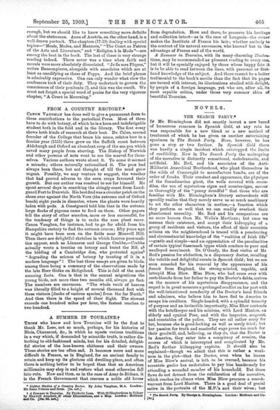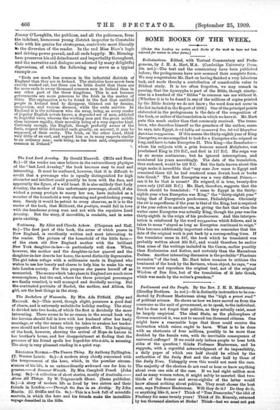NOVELS.
THE SEARCH PARTY.*
hr Mr. Birmingham did not exactly invent a new bland of humorous romance in Spanish Gold, at any rate he was responsible for a new blend or a new method of treatment of which he has given us another entertaining specimen in The Search Party. Here, however, he has gone a step or two further. In Spanish Gold there was hardly a single incident which outstepped the limits of credibility. Now in The Search Party the mainspring of the narrative is distinctly sensational, melodramatic, and artificial. Mr. Red, and his associates of the Anti- Militarist Anarchical Brotherhood, who plant themselves in the wilds of Connaught to manufacture bombs, are of the order of freaks. Their conduct and appearance, the physique of the Scandinavian giant, the walls covered with croco- diles, the use of mysterious signs and countersigns, savour so thoroughly of the "penny dreadful" that those who are familiar with Mr. Birmingham's literary antecedents will speedily realise that they merely serve as so much machinery to set the other characters in motion,—a function which they perform so well that we can readily overlook their phantasmal unreality. Mr. Red and his companions are no more human than Mr. Wells's Martians ; but once we assume their existence, and accept their kidnapping of group of residents and visitors, the effect of their eccentrics actions on the neighbourhood is traced with a penetrating and circumstantial knowledge of the " realities of Irish life" —gentle and simple—and an appreciation of the peculiarities of certain typical Sassenach types which conduce to pure and unalloyed merriment. Dr. O'Grady, the first victim of Mr Red's passion for abduction, is a dispensary doctor, recalling the voluble and delightful curate in Spanish Gold; but we are soon consoled for his removal by the appearance of his fiancée from England, the strong-minded, capable, and intrepid Miss Blow. Miss Blow, who had come over with carte blanche from her father to pay the Doctor's debts, arrives on the morrow of his mysterious disappearance, and the sequel is in great measure a prolonged conflict on her part with the well-intentioned mendacity of the Doctor's local friends and admirers, who believe him to have fled to America to escape his creditors. Single-handed, with a splendid tenacity of purpose and an invincible importunity, Miss Blow contends with the hotelkeeper and his minions, with Lord Manton, an elderly and cynical Peer, and with the inspector, sergeant, and constables of the police. They are all rather sorry for her, because she is good-looking as well as sorely tried; but her passion for truth and masterful ways prove too much for their goodwill, and, believing, as they do, that the Doctor is in America, they enter into a conspiracy of evasion, the course of which is interrupted and complicated by Mr. Red's further kidnapping exploits. It should also be explained—though we admit that this is rather a weak- ness in the plot—that the Doctor, even when he learns of Miss Blow's arrival, is loth to be rescued, because his eccentric gaoler has undertaken to pay him handsomely for attending a wounded member of his household. But these flaws do not detract from the exhilaration of the narrative, which reaches its climax when Miss Blow procures a search- warrant from Lord Manton. There is a good deal of genial satire in the portraits of the M.P.'s and their wives ; but Ca • Ths Search Par* By AAA. Birmingham. London: Mama and Co. la
Jimmy O'Loughlin, the publican, and all the policemen, from the indolent, humorous young district inspector to Constable Cole with his genius for stratagems, contribute most liberally to the diversion of the reader. In the end Miss Blow's logic and driving-power prevail, and all ends happily. Mr. Birming- ham preserves his old detachment and impartiality throughout, and the narrative and dialogue are adorned by many delightful digressions, of which the following may serve as a typical example :—
"Earls are much less common in the industrial districts of England than they are in Ireland. The statistics have never been exactly worked out, but there can be little doubt that there are far more earls to every thousand common men in Ireland than in any other part of the three kingdoms. This is not because governments are more generous to the Irish in the matter of titles. The explanation is to be found in the fact that untitled people in Ireland tend to disappear, thinned out by famine, emigration, and various diseases, while the earls survive. In England it is the noblemen who die away, being, as every reader of popular English novels knows, a degraded set of men, addicted to frightful vices, whereas the working men and the great middle class increase rapidly, their morality being of a very superior kind. Curiously enough, the English, though perfectly aware of the facts, respect their debauched earls greatly, on account, it may be supposed, of their rarity. Tho Irish, on the other hand, think very little of an earl, and regard him as in many respects similar to an ordinary man ; earls being, as has been said, comparatively common in Ireland."











































 Previous page
Previous page